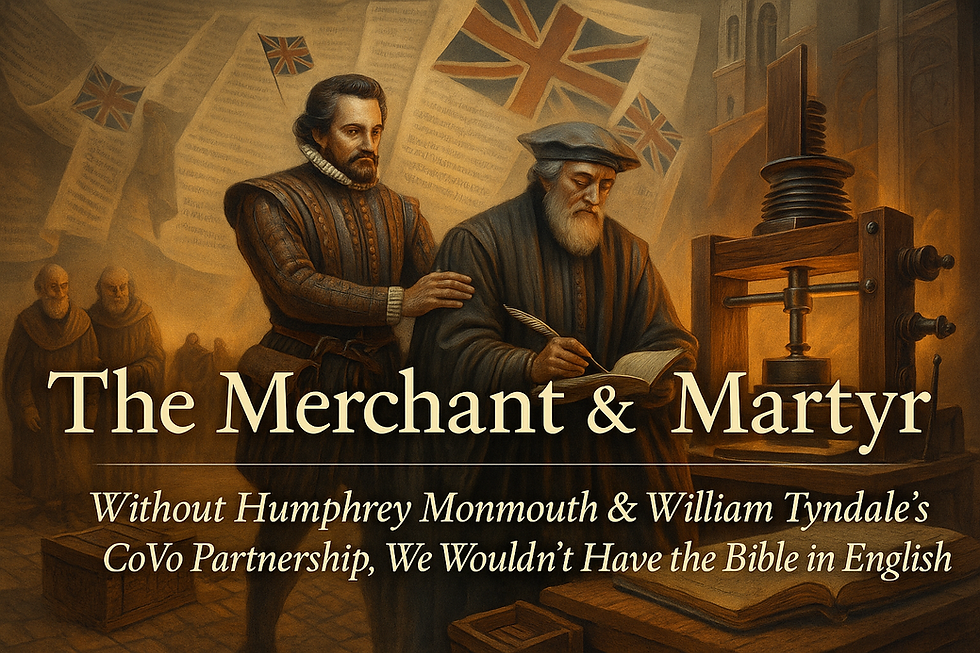Stewarding Inheritance: Building Institutions That Outlast Ourselves
- Guest Contributors

- Apr 11, 2025
- 3 min read
by James Whitley

Institutional Thinking requires faithful reception, an acknowledgement of the debt we owe to the wisdom and labors of our fathers. Everything I have is something I have inherited; I am not an original thinker, but a recipient of an ancient heritage. Even when I learn something “new and revolutionary,” what I am learning stands on the foundation laid by all those who have gone before. Truth and wisdom are not invented in me and my generation; we are ‘debtors who owe something, not… creditors to whom something is owed.” Aside from offering a healthy alternative to modern progressivism’s haste to ‘cancel’ historical figures, this mindset reminds us of the incredible debt we owe to all those who have invested in us directly throughout our lives. From my parents to every mentor and teacher who has given me their time, I am who I am because of their investments. I not only stand on the shoulders of the Western Tradition and the Church Fathers, but also, most importantly, on the shoulders of all the mentors and leaders I have had through my life.
How do I repay such a debt? By building something that will last. Anti-institutional thinking, ultimately, has a vision that goes no further than the individual’s self and circumstances, and this usually breaks down into selfishness, no matter how altruistic one started. Heclo writes that “institutions represent inheritances of valued purpose with attendant rules and moral obligations.” The values that we have faithfully received come with rules and moral obligations—that is, a structure, which exists for the sake of the vision and values, to keep them from fading away. We are living out something that is bigger than us; we are laying the foundation we have received, and building upon it with what we’ve been given, so that we have a house to pass on to our children. According to the abundance we have received, we must generously give. Jesus Christ is the foundation we have been given, the foundation we must lay. We must make every sacrifice to maintain Him as our foundation and build upon Him with gold and silver that will not burn up. If what I have achieved dies with me, I have failed. I must place the riches I have inherited into the hands and hearts of my children, that I may empower them to embody the same vision and the same values that I have received. “Institution” is the means by which we establish and maintain the habits, beliefs, attitudes, and practices that carry on our heritage into the next generation.
All the above depends on humility and self-sacrifice. Postmodernity condemns institutions wholesale because they demand we submit to a vision and purpose greater than ourselves, and to the Postmodernist, true freedom and life is in absolute self-sovereignty. So faithful reception [of a worthwhile inheritance of course] as a mentality requires humility, accepting my limitations and committing to a greater purpose than myself. Building something that will last, putting the inheritance to work for the sake of the next generation, requires self-sacrifice, because I am concerned not with my benefit but with the benefit of my children. That is, my life belongs not to myself, but to the “valued purpose” I have received and want to pass on, which is Christ. The anti-institutional attitude is, consequently, moving away from humility and self-sacrifice. Now, an evil institution entraps individuals and communities in a vision that destroys, an inheritance that poisons. But a good institution compels us towards that which is productive, carrying on the blessings of our fathers to our children.
Much of what I have said could probably be summed up as just Stewardship. Of the three activities of Institutional Thinking that Heclo explores, Stewardship imposes the most upon my mind. The concept of Profession is important, because a job that is merely a job has no value, and something worth doing needs a purpose and a vision; the concept of Office is important, because our work gives us a place in society that we must honor. But it seems like Stewardship is the overarching activity we engage in when doing all these things. There are three phases to being a Steward: being entrusted, faithfully managing, and giving an account. Everything I have been talking about is summarized in these: to faithfully receive is to be entrusted; repaying the debt by building something that will last is, indeed, faithfully managing and, also, a step towards giving an account. An Institution is something we must steward so that it can benefit the next generation.
James Whitley serves up paint at his local Sherwin Williams, reaches out to internationals through Unbound Church an ethincally french-speaking african church in Oklahoma City, and is pursuing his Masters through SEBTS engaging in practicums on the field in Oklahoma.
This article was a response to Hugh Helco's "On Thinking Institutionally" during a Polycentric Leadership cohort.




Comments